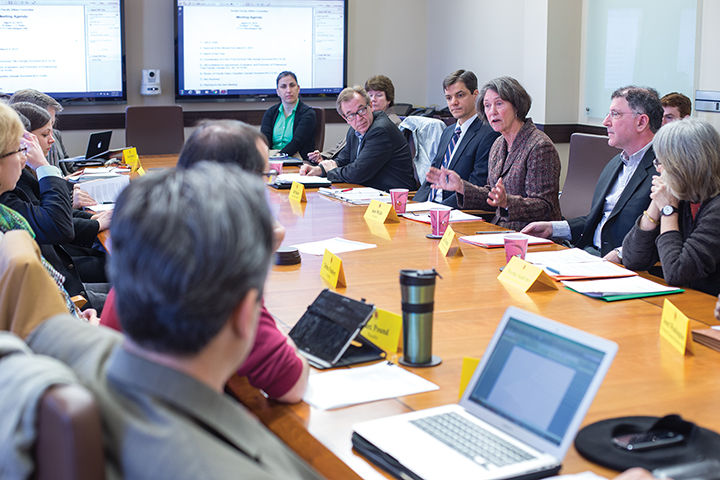
Members of the Senate Faculty Affairs Committee discuss the consideration of a new post-doctoral title at the meeting in Chincoteague Hall on Monday, March 23, 2015.
Beginning postdoctoral students at this university could see a title change due to a University Senate proposal, which would allow departments to decrease benefits such students receive and classify them as non-faculty members.
A group of life sciences professors and administrative chairs appeared before the Faculty Affairs Committee yesterday to discuss adding a second title for postdoctoral students and professionals in temporary positions. The only employee title currently available for postdoctoral students at this university is “postdoctorate research assistant,” which classifies all postdoctoral students as non-tenure-track faculty.
Faculty Affairs Committee Chairman Devin Ellis said he anticipates a change to be decided by the committee and put up for a senate vote by the end of this semester. If passed, the change would take effect for the upcoming fiscal year, which starts July 1.
“What I’m concerned about is, if we create a category with no benefits, it’s a race to the bottom,” Marc Pound, a committee member and astronomy senior research scientist, said at the meeting.
This initiative for a new title stemmed directly from a letter on this issue that 131 professors signed on behalf of the university’s life sciences programs. The letter states that considering postdoctoral students faculty gives their departments a disadvantage, as the high level of benefits would lead to a “research funding erosion” resulting from less money going toward research.
The university funds allocated toward postdoctoral students include fringe-benefit coverage as well as money for research. As the number of postdoctoral students increases, more funds are required to cover fringe benefits and there is less money available for research. This proposal aims to create a new title for incoming postdoctoral students that would not require departments to allocate benefits such as full retirement benefits, health insurance and tuition remission for this title. Therefore, there would be more money available for research for current postdoctoral students.
The life sciences programs collected research on postdoctoral students from the other Big Ten schools and found that out of the 13 other schools in the conference, eight offer health benefits and two offer retirement benefits. The only other schools to offer retirement benefits are Northwestern University and Indiana University, which both have significantly higher funding for life sciences.
Jonathan Dinman, professor and cell biology and molecular genetics department chairman, said the current academic environment requires this new title for postdoctoral students for this university to stay competitive and on track with fellow Big Ten schools.
Faculty Affairs Committee member Ellin Scholnick said she was concerned this change may take even more away from postdoctoral students, who she said are already some of the lowest-compensated people on the campus.
“Talking about taking away benefits from the least-paid individuals … I’m deeply worried about the impact on the post-docs themselves, who already live on the edge,” Scholnick said at the meeting.
While a new title would not leave postdoctoral students completely without benefits, it is likely the policy would lower the minimum level of benefits for entering postdoctoral students at this university.
The committee expects that people who are currently in postdoctoral associate positions cannot be pushed to a lower position and lose benefits from the change.
Some postdoctoral students might even gain benefits from this change, Ellis said. Roughly 15 percent of postdoctoral students were assigned to a more flexible position in the old system that handed out benefits on a case-by-case basis, Ellis said, leaving some postdoctoral students with very few. This change could be an improvement for some of them, as they would have some benefits.
The committee requested to receive and review a plan from Provost Mary Ann Rankin that will explicitly grant health and retirement benefits for postdoctoral students with this proposed title.



